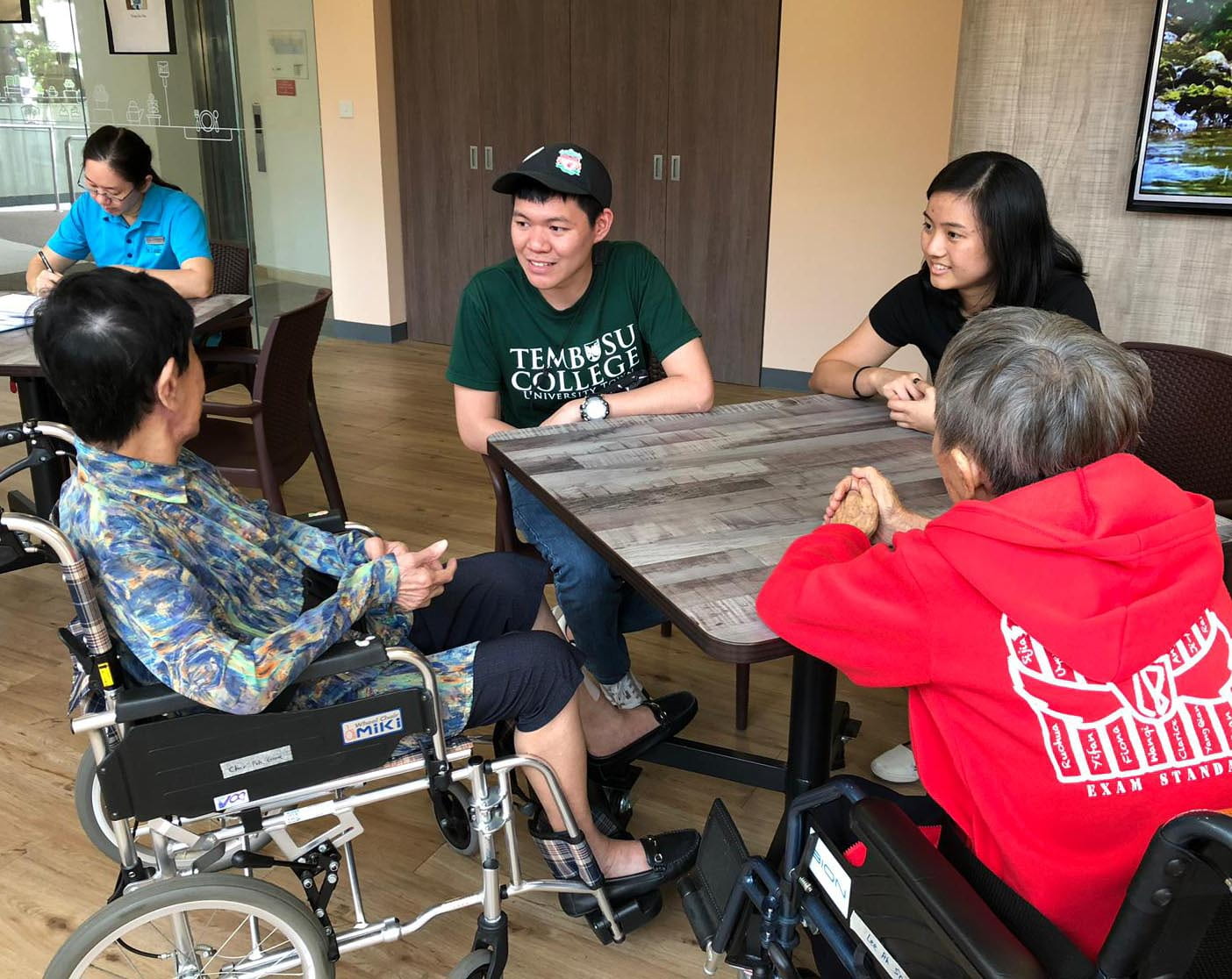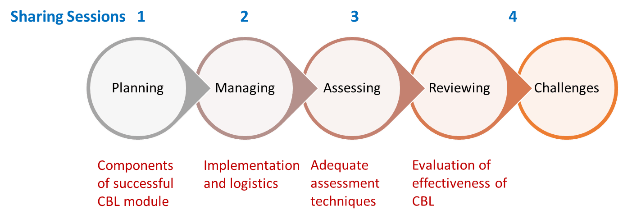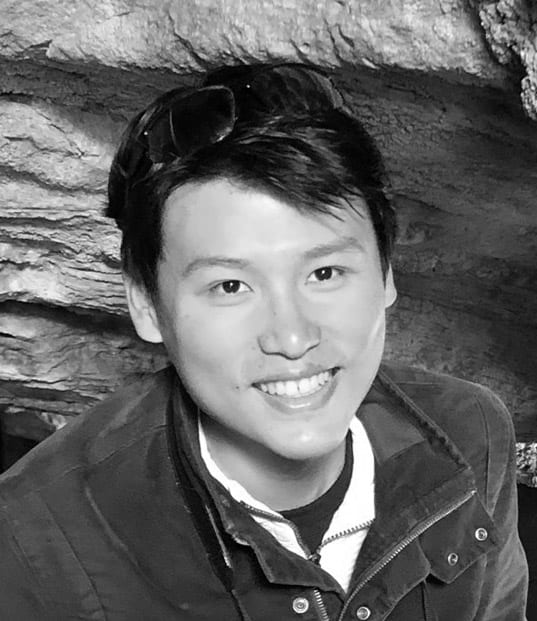James KAH, Department of Biomedical Engineering, College of Design and Engineering (CDE), and
KUAN Yee Han, Tembusu College
James and Yee Han take us through their Learning Community’s examination of community-based learning and how community-based learning activities can be effectively integrated into academic courses.
Student engagement with elderly in St Luke’s Elder Care (Photo provided by the authors).
Kah, J. C. Y., & Kuan, Y. H. (2023, July 26). A learning community for community-based learning. Teaching Connections. https://blog.nus.edu.sg/teachingconnections/2023/07/26/a-learning-community-for-community-based-learning/
Setting Up A Learning Community on Community-based Learning
Community engagement in most curricula tends to be standalone as an extracurricular activity. There is limited integration of community engagement activities with the discipline-specific knowledge and skills taught in our academic courses , even though such integration could be harnessed as a strong learning motivator given our Gen Z students’ inclination to find meaning and social impact through their learning. The lack of integration observed motivated me and my colleague Yee Han to start a Learning Community (LC)1, where 13 educators from different faculties come together to examine published frameworks on community-based learning (Figure 1). Our LC also discussed and shared best practices on how our respective courses could be re-designed to consciously incorporate elements of community-based learning in a discipline-specific manner to improve learning outcomes and achieve social impact.
 Figure 1. Members of our LC on “Curriculum Re-design for Greater Community-based Learning”.
Figure 1. Members of our LC on “Curriculum Re-design for Greater Community-based Learning”.
Top row (L-R): Kuan Yee Han (Tembusu College), James Kah (Engineering), Stephen Hsu (Dentistry), Zhou Wentao (Nursing); Middle row (L-R): Bimlesh Wadhwa (Computing), Lim Cheng Puay (Ridge View Residential College), Angeline Lim (Chua Thian Poh Community Leadership Centre), Norman New (RVRC); Bottom row (L-R): Jonathan Chen (Computing), Kiruthika Ragupathi (CDTL), Dujeepa Samarasekera (Medicine), Muhammad Nawaz (Geography). Not in picture: Sue Chang-Koh (College of Alice and Peter Tan).
What is Community-based Learning?
Meanwhile, we examine what community-based learning is before we delve further into our LC’s activities in this post. Community-based learning is a teaching strategy that fosters active and engaged learning by integrating experiential learning and student research with classroom learning through community engagement (Asok et al., 2016; Morris, 2020). It allows students to directly put academic theory into real-world practice, and has a substantial pedagogical research base, grounded in the notion that learning is more effective if it is not just theoretical but also experiential and inquiry-based (Watson & West, 1996). It therefore gives students an opportunity to develop a broader and deeper understanding of course content and higher-order thinking skills (Quitadamo et al., 2008) by implementing the content as they learn it.
Our Learning Community’s Activities
Within the constraints posed by COVID-19 restrictions, we organised four online sharing sessions in 2020 and 2021 that were mapped to the key activities in a community-based learning framework, as shown in Figure 2. As part of these sharing sessions, our LC reviewed a few key journal articles (Bedri et al., 2017; Owens & Wang, 1996; Westoby & Shevellar, 2016) and books (Jacoby, 2014; Shevellar, 2016) that published community-based learning frameworks for higher education. We read and discussed these literatures to learn how discipline-specific community-based learning could be best implemented in different courses through re-designing existing ones to consciously embed critical elements based on established frameworks, such as modifying assignments or activities to involve a partner social agency. We also invited existing practitioners in the NUS community to share their experience, best practices and challenges faced, as well as how their practice would fit into existing pedagogical frameworks. Our LC brainstormed during these sharing sessions as well, where members identified gaps in their respective courses, and drafted out plans on how these gaps could be filled by community-based learning. These activities have inspired some members to consider implementing community-based learning in their courses.

Figure 2. Online programme comprising four workshops conducted over Zoom that were mapped to the key activities in a community-based learning framework that the LC adopted.
The LC also organised a campus-wide online symposium on “Curriculum Re-Design for Greater Community-Based Learning” in July 2021, where colleagues from the wider NUS teaching community were also invited to discuss and advocate for community-based learning in NUS. The three-hour online symposium attracted 238 registrations and 188 participants, and comprised a talk by our external speaker Barbara Jacoby [whose book Service-learning Essentials (2014) our LC had been referencing for our discussions], sharing by some members of our LC on our experience in implementing community-based learning, and breakout room discussions.
Developing an Online Resource on Community-based Learning
Following the online symposium, we also developed a community-based learning microsite2 as an online resource tool that summarised what we have learnt through the sharing sessions and symposium to provide guidance, best practices and case study examples of the community-based learning framework that we have adopted (Figure 3). It includes steps to incorporate community-based learning in NUS courses with localised context. This microsite received the Consolation Prize (geNiUSbooks) in the inaugural 2021 geNiUSchannel and geNiUSbooks competition. We hope for this microsite to be shared with the NUS community and that it will be useful in inspiring lecturers across NUS to consider re-designing their courses to incorporate community-based learning as a pedagogical approach.
Figure 3. Screenshot of our microsite on community-based learning, an online resource tool that summarised what our LC learnt through the sharing sessions and symposium. The site showcases best practices and case study examples of the community-based learning framework that we adopted. (Click on the image for the link to the microsite; you will need to key in your NUS login details to enter the microsite.)
Concluding Reflections
A post-symposium online survey indicated that the symposium has been inspiring and useful to many participants, particularly in providing a framework to implement community-based learning in different courses (see Appendix for details of the participants’ experience ratings about the symposium). We believe that discipline-specific community-based learning that taps on the student’s knowledge and training does not merely create better learning outcomes for students, but also creates meaningful social impact while fulfilling their educational objectives. Such community partnerships also maximise the learning outcomes beyond the prescribed course learning outcomes, to also include imbuing in students the intangible attributes of empathy and volunteerism. Moving forward, our LC will also be encouraging members to collaborate in cross-faculty joint community-based learning in our courses to promote interdisciplinary learning.
Endnotes
- This Learning Community project was made possible due to the generous support of a Teaching Enhancement Grant (TEG) from the Centre for Development of Teaching and Learning (CDTL).
- Please key in your NUS login details to enter the microsite.
Appendix. Participants’ experience ratings about the symposium
References
Asok, D., Abirami, A., Angeline, N., & Lavanya, R. (2016, December 9-10). Active learning environment for achieving higher-order thinking skills in engineering education [Paper presentation]. 2016 IEEE 4th International Conference on MOOCs, Innovation and Technology in Education (MITE), Madurai, India. https://doi.org/10.1109/MITE.2016.020
Bedri, Z., de Fréin, R., & Dowling, G. (2017). Community-based learning: A primer. Irish Journal of Academic Practice, 6(1), 5. http://dx.doi.org/10.21427/D7F143
Jacoby, B. (2014). Service-learning essentials: Questions, answers, and lessons learned. John Wiley & Sons.
Morris, T. H. (2020). Experiential learning–a systematic review and revision of Kolb’s model. Interactive Learning Environments, 28(8), 1064-77. https://doi.org/10.1080/10494820.2019.1570279
Owens, T. R., & Wang, C. (1996). Community-based learning: A foundation for meaningful educational reform. Service Learning, General. 37. https://digitalcommons.unomaha.edu/slceslgen/37
Quitadamo, I. J., Faiola, C. L., Johnson, J. E., & Kurtz, M. J. (2008). Community-based inquiry improves critical thinking in general education biology. CBE—Life Sciences Education, 7(3), 327-37. https://doi.org/10.1187/cbe.07-11-0097
Shevellar, L. (2016). Learning and mobilising for community development: A radical tradition of community-based education and training. Routledge.
Watson, D. E., & West, D. J. (1996). Using problem‐based learning to improve educational outcomes. Occupational Therapy International, 3(2), 81-93. https://doi.org/10.1002/oti.29
Westoby, P., & Shevellar, L. (2016). A perspective on community-based education and training. In Learning and Mobilising for Community Development (pp. 13-24). Routledge.
 |
James KAH is currently an Associate Professor in the Department of Biomedical Engineering and Assistant Dean in the Office of Undergraduate Programmes at the College of Design and Engineering (CDE) at NUS. As an educator, James runs courses on Gerontechnology in Ageing and Assistive Technology for Persons with Disability (PWDs) while leveraging on novel educational strategies in community-based learning to teach and drive innovations in these areas through co-designing solutions with the elderly and disability communities in Singapore towards community deployment to address their challenges to daily living. As Assistant Dean, he oversees CDE’s outreach efforts to educator partners in high schools and to prospective undergraduates. James can be reached at kah@nus.edu.sg. |
 |
KUAN Yee Han is a Senior Lecturer at Tembusu College and serves concurrently as Assistant Dean of Students at the Office of Student Affairs and Master at UTown Residence. As an educator, Yee Han combines complementary pedagogies of experiential learning and authentic learning to create an engaging and effective learning environment. He teaches multidisciplinary seminar classes on negotiation and ageing in Singapore, as well as conduct many out-of-classroom living and learning experiences. Yee Han is also a certified Lego Serious Play facilitator, and has received numerous prestigious awards, including the Residential College Teaching Excellence Honour Roll and University Annual Teaching Excellence Award (AY18/19 and AY19/20). Yee Han can be reached at yeehan@nus.edu.sg. |


